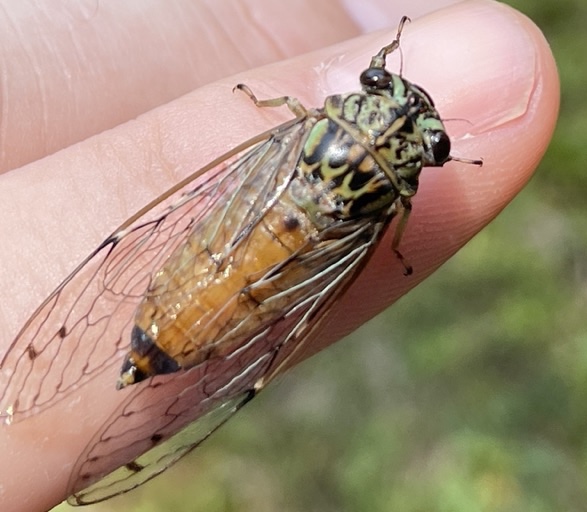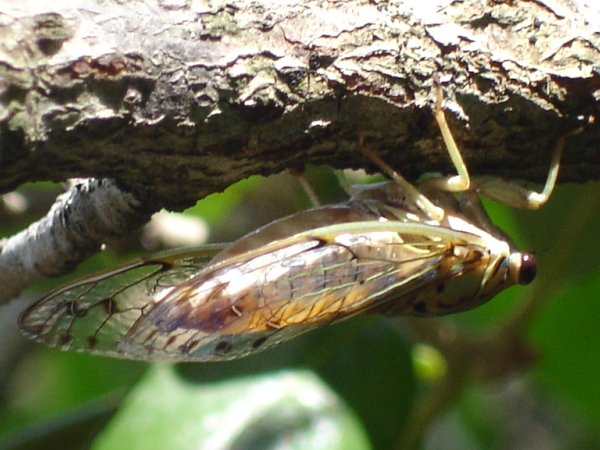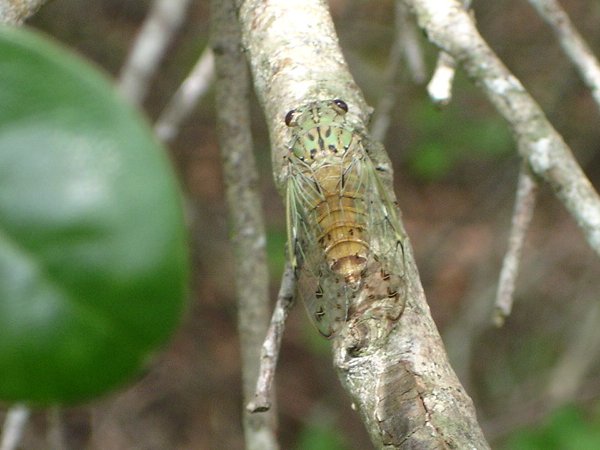Neocicada hieroglyphica hieroglyphica (Say, 1830) and Neocicada hieroglyphica johannis (Walker, 1850) aka Hieroglyphic Cicada.

Neocicada hieroglyphica hieroglyphica by Dan, 2022, New Jersey.

Neocicada hieroglyphica hieroglyphica by Joe Green, 2007, Florida.

Neocicada hieroglyphica hieroglyphica Photo by Joe Green.
See all Neocicada hieroglyphica hieroglyphica images and information on cicadamania.com.
There are two subspecies of Neocicada hieroglyphica: Neocicada hieroglyphica hieroglyphica (Say, 1830) and Neocicada hieroglyphica johannis (Walker, 1850). According to Wm. T. Davis, a key difference is: on N. hieroglyphica johannis, “the black marks on the head, pronotum and mesonotum are more in the form of spots than of continuous lines as in typical hieroglyphica”.
Song type: Call
Source: ©Insect Singers | Species: N. hieroglyphica hieroglyphica
Song type: Call
Source: ©Joe Green | Species: N. hieroglyphica hieroglyphica
Song type: Pre Call
Source: ©Joe Green | Species: N. hieroglyphica hieroglyphica
Song type: Call
Source: ©Joe Green | Species: N. hieroglyphica hieroglyphica
Video
Video Playlist
Playlists contain multiple videos found on YouTube.
Name, Location and Description
- Cicada Names: Neocicada hieroglyphica hieroglyphica (Say, 1830) and Neocicada hieroglyphica johannis (Walker, 1850)
- Short Names: N. hieroglyphica hieroglyphica and N. hieroglyphica johannis
- Former name/synonyms: Cicada hieroglyphica
- Common Name: Hieroglyphic Cicada
- When: May-August. Peaks in June.
- Where are they found: N. hieroglyphica hieroglyphica is found in AL, AR, DE, FL, GA, IL, IN, KS, KY, LA, MD, MS, MO, NJ, NY, NC, OH, OK, SC, TN, TX, VA, and N. hieroglyphica johannis is found in Florida
- Maps: Biogeography of the Cicadas (Hemiptera: Cicadidae) of North America, North of Mexico [PDF]
- Description: Black, brown and green patterns.
- Eye Color: varies
- Pronotal Collar Color: varies
- Identification: Bug Guide
- Identification: iNaturalist
- Subject Matter Expert website: Cicada Central
- Taxonomic Information: Integrated Taxonomic Information System
- Song: Insect Singers
A description by Wm. T. Davis from MISSISSIPPI CICADAS, WITH A KEY TO THE SPECIES OF THE SOUTHEASTERN UNITED STATES1:
Cicada hieroglyphica Say.
Occurs from Riverhead, Long Island, N. Y., to eastern Kansas and southward. In peninsular Florida the variety johannis Walker replaces the typical form. The black marks on the head, pronotum and mesonotum are more in the form of spots than of continuous lines as in typical hieroglyphica.The song does not continue long, but sometimes, as in the Pine Barrens of New Jersey, the insects appear in numbers, when their united effort produces a considerable noise.
Classification:
Family: Cicadidae
Subfamily: Cicadinae
Tribe: Cicadini
Subtribe: Leptopsaltriina
Genus: Neocicada
Species: Neocicada hieroglyphica
Subspecies: Neocicada hieroglyphica hieroglyphica (Say, 1830)
Subspecies: Neocicada hieroglyphica johannis (Walker, 1850)
List of sources
- (1) Davis, W.T. 1918. MISSISSIPPI CICADAS, WITH A KEY TO THE SPECIES OF THE SOUTHEASTERN UNITED STATES. Journal New York Entomological Society. Volume 26. Read it on Archive.org.
- Full Binomial Names: ITIS.gov
- Common names: BugGuide.net; The Songs of Insects by Lang Elliott and Wil Herschberger; personal memory.
- Locations: Biogeography of the Cicadas (Hemiptera: Cicadidae) of North America, North of Mexico by Allen F. Sanborn and Polly K. Phillips.
- Descriptions, Colors: personal observations from specimens or photos from many sources. Descriptions are not perfect, but may be helpful.
Notes:
- Some descriptions are based on aged specimens which have lost some or a lot of their color.
3 replies on “Neocicada hieroglyphica aka Hieroglyphic Cicada”
In the Buxton area on the NC Outer Banks, this cicada appears to be most associated with the red cedars (Juniperus sp.). Nymphs are most often found on those trees. Do they feed on Juniperus roots??? Certainly appears that way.
Sounds plausible.
I believe these are the ones I’m hearing in Central Florida, east Orange County. For the past 3 or 4 days.